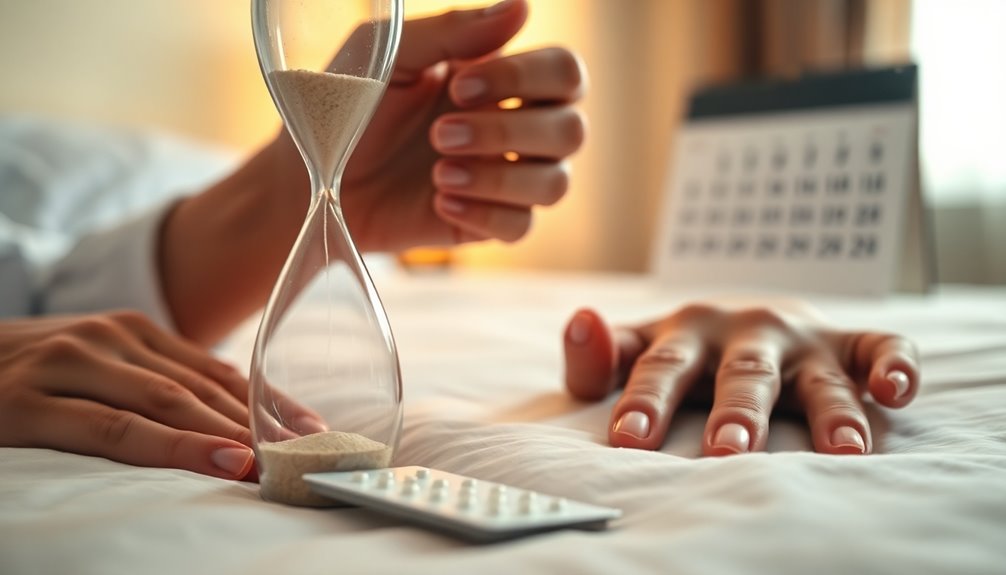To prevent pregnancy after sex, act quickly. You can use emergency contraception (EC) pills, which are most effective when taken within 72 hours, and can work up to 120 hours post-intercourse. The Copper IUD is another option, but must be inserted within five days. Natural remedies, like consuming ginger tea or vitamin C, may offer some help, but their effectiveness isn't guaranteed. Additionally, consider barrier methods like condoms or hormonal birth control for ongoing prevention. Consulting a healthcare professional can provide tailored advice and guarantee you know all your options. Discover more effective strategies and methods available.
Key Takeaways
- Take Emergency Contraceptive Pills (ECPs) within 72 hours post-intercourse for maximum effectiveness in preventing pregnancy.
- Consider the Copper IUD, which can be inserted within 5 days after sex to effectively prevent fertilization.
- Explore natural remedies such as Vitamin C and ginger tea, but note their effectiveness is not scientifically validated.
- Use barrier methods like condoms to prevent sperm from reaching the egg during intercourse.
- Always consult a healthcare professional for personalized advice and to understand your contraceptive options.
Understanding Emergency Contraception

When you find yourself in a situation of unprotected sex, understanding emergency contraception (EC) can be essential.
EC is designed to prevent pregnancy and is most effective when taken within 72 hours, though you can use it up to 120 hours after intercourse. Hormonal birth control pills work primarily by delaying ovulation, while the copper IUD can be inserted by a healthcare professional, also effective at preventing pregnancy if done within five days.
The failure rate for EC pills is low—about 1-2%—when taken promptly, highlighting the importance of acting quickly. While side effects like nausea and headaches can occur, they usually resolve within a few days.
Knowing your options empowers you to make informed decisions.
How Emergency Contraception Works

Emergency contraception works primarily by delaying ovulation, so an egg isn't released for fertilization after unprotected sex.
It's essential to take it within the right timeframe for maximum effectiveness, as timing greatly influences its success rate.
While most people tolerate it well, some may experience side effects that are important to know.
Mechanism of Action
Understanding how emergency contraception works is vital for anyone looking to prevent unintended pregnancy.
Emergency contraceptive pills (ECPs) primarily delay or inhibit ovulation, preventing the release of an egg from your ovaries. If you take ECPs within 72 hours after unprotected sex, they can reduce your risk of pregnancy by 1-2%.
It's significant to recognize that ECPs don't disrupt or terminate an existing pregnancy; their focus is solely on preventing fertilization. Timing is essential for effectiveness, with ECPs working best when taken as soon as possible after unprotected intercourse.
Alternatively, the Copper IUD acts as emergency contraception by creating a hostile environment for sperm and can be effective if inserted within 5 days post-coitus.
Timing for Effectiveness
To maximize the effectiveness of emergency contraception, timing is essential. You should take emergency contraception as soon as possible after unprotected sex.
The best results occur when you take it within 72 hours, with a failure rate of just 1-2%. However, you can still use it up to 120 hours (5 days) post-intercourse, though effectiveness decreases the longer you wait.
If you prefer, consider the Copper IUD, which can be inserted by a healthcare provider and is effective for up to 5 days, boasting a failure rate of over 99.9%.
Remember, emergency contraception works by delaying ovulation and won't interrupt an existing pregnancy if fertilization has already occurred.
Act quickly to prevent pregnancy!
Side Effects Overview
While many people rely on emergency contraception (EC) for unexpected situations, it's important to be aware of the potential side effects that can accompany its use.
EC primarily works by delaying ovulation to prevent fertilization after unprotected sex. Common side effects include nausea, vomiting, breast tenderness, and headaches, which usually resolve within 1-2 days.
You might also experience spotting or changes in your menstrual cycle, as EC can temporarily disrupt your hormonal balance.
Remember, EC doesn't affect an existing pregnancy and is ineffective if taken after ovulation has occurred.
For maximum effectiveness, take it within 72 hours post-unprotected sex, noting that the failure rate during this timeframe is only 1-2%.
Effectiveness of Emergency Contraception

Emergency contraception (EC) offers an essential option for those who experience unprotected sex, especially when taken promptly. ECPs are most effective when you take them within 72 hours, boasting a failure rate of just 1-2% with timely use. They work primarily by delaying ovulation, helping to prevent pregnancy before it begins.
If you're looking for an even more effective option, the copper IUD can be inserted up to five days after unprotected intercourse and is over 99.9% effective. However, keep in mind that ECPs don't protect against future unprotected sex and shouldn't replace regular contraceptive methods.
While side effects like nausea and menstrual irregularities can occur, they usually resolve within a couple of days.
Natural Remedies for Prevention

After exploring the effectiveness of emergency contraception, you might be curious about natural remedies that some believe can help prevent pregnancy after unprotected sex.
Consuming papaya twice daily for 3-4 days may disrupt hormonal levels, potentially lowering your chances of pregnancy.
Eating pineapple for 2-3 days can alter the uterine lining due to its bromelain content, which might prevent implantation.
A mixture of ginger tea (two cups daily) could stimulate menstrual flow and induce periods, possibly helping to avoid pregnancy.
You might also consider juniper berries for three days post-intercourse, as they're thought to possess contraceptive effects.
Finally, taking vitamin C (1500 mg twice daily for 2-3 days) may interfere with progesterone levels, further reducing pregnancy risk.
Timing and Intercourse Practices

To effectively avoid pregnancy, you should track your ovulation cycle closely.
Abstaining from intercourse during your fertile window is key to reducing risk.
Track Ovulation Cycle
Understanding your ovulation cycle is crucial for effectively reducing the chances of unintended pregnancy. To track your cycle accurately, monitor your menstrual patterns and identify your fertile days, which typically span five days before ovulation and one day after.
Ovulation usually occurs around 12-14 days before your next expected period. Pay attention to physical signs, like changes in cervical mucus and a rise in basal body temperature, to pinpoint ovulation.
Engaging in sexual activity during non-fertile days—generally seven days before your period—can further minimize conception risks. Remember, consistency in tracking is essential; fertility awareness methods can be about 76% effective when followed diligently.
Abstain During Fertile Window
Tracking your ovulation cycle helps you identify the fertile window, making it easier to avoid unprotected intercourse during this time.
To effectively manage your fertility awareness, consider these tips:
- Recognize that the fertile window spans 5 days before ovulation to 1 day after.
- Note that ovulation typically occurs 12-14 days before your next menstrual period.
- Monitor bodily signs like changes in cervical mucus and basal body temperature.
- Engage in sexual activity during the infertile phase to reduce pregnancy risk.
- Consistently abstain during identified fertile days for better effectiveness.
Post-Sex Actions to Consider

After sex, there are several actions you can take to help minimize the risk of unintended pregnancy and promote overall reproductive health.
First, urinate immediately to flush out bacteria and reduce the risk of urinary tract infections (UTIs). Drinking water afterward can further help eliminate any remaining sperm and bacteria, offering additional protection against pregnancy and UTIs.
If you have natural spermicides available, using them correctly before intercourse may also add a layer of prevention.
It's important to monitor your menstrual cycles and understand your ovulation timing, as this knowledge helps you identify your fertile window and make informed decisions about post-sex actions.
Engaging in light physical activity might assist your body's natural processes, though its effectiveness in preventing pregnancy isn't scientifically confirmed.
Barrier and Hormonal Methods

To effectively prevent pregnancy, it's important to evaluate barrier and hormonal methods alongside post-sex actions. Here's what you should consider:
- Barrier methods like male and female condoms block sperm from reaching the egg.
- Male condoms are over 80% effective and help prevent STIs.
- Female condoms are about 79% effective and can be bought over-the-counter.
- Hormonal birth control, including pills and IUDs, alters hormonal levels to prevent ovulation, boasting over 90% effectiveness with proper use.
- Diaphragms and cervical caps, used with spermicide, offer varying effectiveness from 70-90%.
Understanding these options can empower you to make informed choices about your reproductive health and effectively prevent pregnancy.
Consulting a Healthcare Professional

While it's natural to feel uncertain after unprotected sex, consulting a healthcare professional is crucial for exploring your options.
They can help you understand the most suitable emergency contraception, like the emergency contraceptive pill (ECP) or the copper IUD, which can prevent pregnancy if used promptly.
A healthcare provider will offer personalized medical advice based on your health history and the timing of intercourse.
Additionally, if you're worried about potential sexually transmitted infections (STIs), they can provide testing and treatment.
Ongoing consultations guarantee you choose the most effective long-term birth control methods as a sexually active individual.
Don't hesitate to reach out; informed decisions are key to managing your reproductive health.
Frequently Asked Questions
How Do I Make Sure I Don't Get Pregnant After Unprotected?
To make sure you don't end up pregnant after unprotected sex, act quickly.
Take emergency contraception (ECP) within 72 hours for the best chance, but you can use it up to 120 hours later.
If you weigh over 70 kg, consider taking two doses of ECP or ask your healthcare provider about the Copper IUD.
Keep track of your menstrual cycle and take a pregnancy test if your period's over a week late.
How Can I Be Sure I Am Not Pregnant After Sex?
To be sure you aren't pregnant after sex, take a pregnancy test about 3-4 weeks later or 1-2 weeks after a missed period for the best accuracy.
If you want to act sooner, consider consulting a healthcare provider for guidance. They can help you understand your options and clarify any doubts.
Staying informed about your menstrual cycle and ovulation can also empower you to manage your reproductive health effectively.
How Can I Clean up After Sex to Avoid Pregnancy?
So, you think a quick wipe and a cute smile will do the trick? Not quite!
After sex, you can help yourself by urinating immediately, which might flush out any lingering troublemakers.
Drink water to stay hydrated and keep your urinary tract happy.
Avoid lying down for at least 30 minutes; gravity's got your back!
A stroll post-coitus could help too.
Oh, and consider using a spermicide next time for added protection!
How Can I Make Sure I Don't Get Pregnant After?
To guarantee you don't face an unexpected pregnancy, act quickly.
Take emergency contraception as soon as possible, ideally within 72 hours. If it's within five days, consider visiting a healthcare provider for a copper IUD.
Also, keep an eye on your menstrual cycle and track ovulation to better plan in the future.
If your period's late after taking emergency contraception, get in touch with a healthcare provider for guidance.
Conclusion
In the whirlwind of life, it's essential to take control of your reproductive health. Remember, emergency contraception can be your safety net, but timing is everything. Don't leave your future to chance—consider barrier and hormonal methods for ongoing protection. If you're ever in doubt, don't hesitate to consult a healthcare professional. By being informed and proactive, you can navigate your choices confidently and steer clear of unplanned pregnancies. Your body, your choices—make them count!










